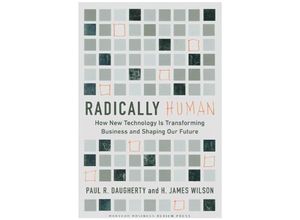Technology advances are making tech more . . . human. This changes everything you thought you
knew about innovation and strategy. In their groundbreaking book Human + Machine Accenture
technology leaders Paul R. Daugherty and H. James Wilson showed how leading organizations use
the power of human-machine collaboration to transform their processes and their bottom lines.
Now as new AI powered technologies like the metaverse natural language processing and
digital twins begin to rapidly impact both life and work those companies and other pioneers
across industries are tipping the balance even more strikingly toward the human side with
technology-led strategy that is reshaping the very nature of innovation. In Radically Human
Daugherty and Wilson show this profound shift fast-forwarded by the pandemic toward more
human-and more humane-technology. Artificial intelligence is becoming less artificial and more
intelligent. Instead of data-hungry approaches to AI innovators are pursuing data-efficient
approaches that enable machines to learn as humans do. Instead of replacing workers with
machines they're unleashing human expertise to create human-centered AI. In place of lumbering
legacy IT systems they're building cloud-first IT architectures able to continuously adapt to
a world of billions of connected devices. And they're pursuing strategies that will take their
place alongside classic winning business formulas like disruptive innovation. These
against-the-grain approaches to the basic building blocks of business-Intelligence Data
Expertise Architecture and Strategy (IDEAS)-are transforming competition. Industrial giants
and startups alike are drawing on this radically human IDEAS framework to create new business
models optimize post-pandemic approaches to work and talent rebuild trust with their
stakeholders and show the way toward a sustainable future. With compelling insights and fresh
examples from a variety of industries Radically Human will forever change the way you think
about practice and win with innovation.

